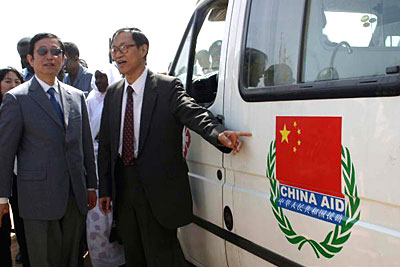|

China and the United States both favor a political solution to the Darfur crisis, support the dual-track approach to resolving the crisis and underline reconstruction and development efforts, said Liu Guijin, Special Representative of the Chinese Government for Darfur.
The dual-track approach, initiated by China, attaches equal importance to the peacekeeping operation and the political process in Darfur.
China and the United States mainly diverge on issues such as how to realize peace and stability, and how to seek a quick end to the conflict and stop the bloodshed and suffering of the ordinary people there, Liu said.
"For China, we oppose sanctions and embargoes, because we think if others impose sanctions and embargoes against a certain nation, the consequence would be the suffering of the people," he was quoted by Xinhua News Agency as saying. "Sanctions and embargoes cannot solve the problems."
Liu made the remarks during his trip to Sudan on February 24-27. Apart from meeting Sudanese officials in the capital city of Khartoum, he visited South Darfur to assess the security and humanitarian situations in the region. Before going to Sudan, he stopped in London where he talked with British government officials and MPs.
Chinese international affairs experts say that while China's policies on and contributions to addressing the Darfur issue have been in the right direction, the issue will not be resolved in the foreseeable future given its extraordinary complexity.
Concrete steps
Darfur is an arid, underdeveloped region in western Sudan. Fighting flared up there in February 2003 after rebels took up arms against the Sudanese Government, accusing it of marginalizing the region. A humanitarian crisis has since emerged. Western countries, particularly the Unites States, have ratcheted up pressure and imposed sanctions on Khartoum because of the Darfur issue.
Liu made his trip to Britain and Sudan at a special time that marked the fifth anniversary of the beginning of the Darfur crisis, said He Wenping, Director of the Division of African Studies at the Institute of West Asian and African Studies at the Chinese Academy of Social Sciences (CASS). Five years after the Darfur crisis started, the region has yet to break the stalemate. Also, some Western media, individuals and nongovernmental organizations have been exerting pressure on the Chinese Government by linking the Darfur issue to the Beijing Olympics. For instance, U.S. filmmaker Steven Spielberg announced on February 13 that he was quitting his post as an artistic advisor to the Beijing Games because of concerns over the situation in Darfur.
"Liu's trip helped inform more people of what China has done to resolve the Darfur issue, gear up China's assistance to Darfur and revitalize the peace process in the region," He said.
Echoing He's views, Wang Hongyi, an African affairs expert at the China Institute of International Studies, said Liu's trip enhanced the mutual trust between China and the Sudanese Government.
Sudanese President Omer al-Bashir told Liu during their meeting that Sudan was grateful for China's unremitting efforts to push for a settlement of the Darfur issue. Foreign Minister Deng Alor told reporters that he expected the Beijing Olympic Games to be a success despite the pressure on China over Darfur. Instead of threatening to boycott the Beijing Games, Western organizations that disagree with China's activities in Sudan should resolve the Darfur crisis in a proper manner instead of putting more pressure on China, he said.
| 